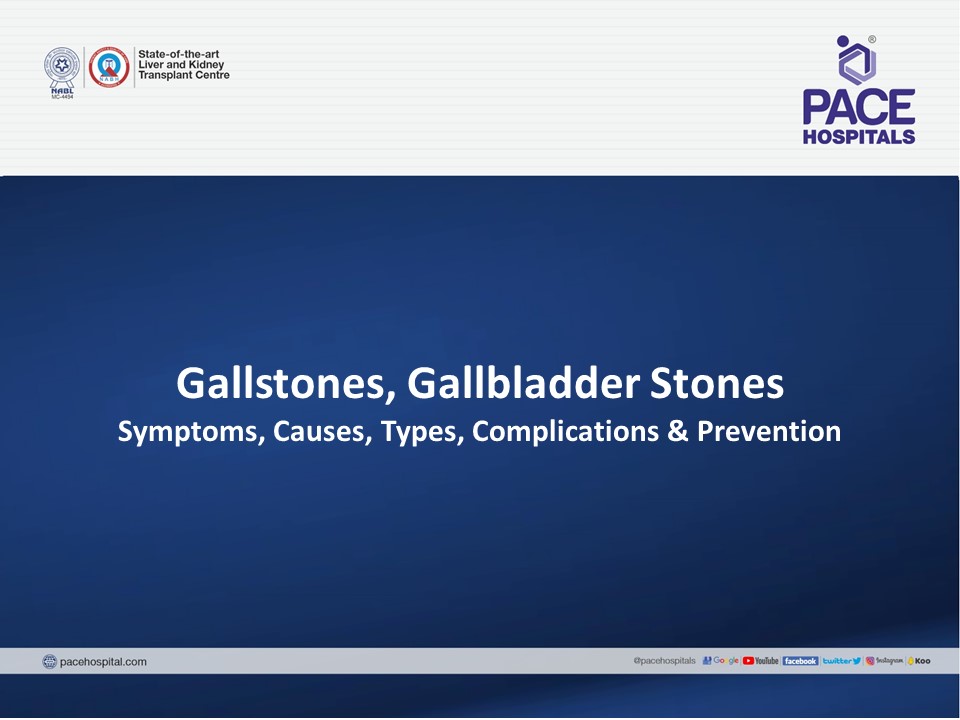Gallstones, Gallbladder Stones – Symptoms, Causes, Complications - PowerPoint PPT Presentation
Title:
Gallstones, Gallbladder Stones – Symptoms, Causes, Complications
Description:
Gallbladder stones or Gallstones are the hardened pebble-like particles that form in the gallbladder, it is also called as cholelithiasis. There could be a single massive gallstone, hundreds of smaller stones, or a combination of small and large stones in the gallbladder. Usually, until symptoms occur, gallstones are not dangerous. Nevertheless, in the long term as they can cause biliary cholic and various other complications. Treatment is necessary, at least at that time. – PowerPoint PPT presentation
Number of Views:5
Title: Gallstones, Gallbladder Stones – Symptoms, Causes, Complications
1
Gallstones, Gallbladder Stones Symptoms, Causes,
Types, Complications Prevention
2
- Gallbladder stones are hard deposits that form in
the gallbladder. The gallbladder is a small organ
that sits below the liver and stores bile, a
fluid that helps digest fats. Gallstones can be
made of cholesterol, bilirubin, or a combination
of both. - What are the symptoms of gallbladder stones?
- Not everyone with gallbladder stones has
symptoms. However, when symptoms do occur, they
can include - Upper right abdominal pain, often after eating
fatty foods - Nausea and vomiting
- Fever and chills
- Pain in the back or shoulder
- Indigestion
- Bloating
- Gas
3
- What are the causes of gallbladder stones?
- The exact gallbladder stones cause is unknown.
However, there are certain factors that can
increase your risk of developing them, such as - Obesity
- Rapid weight loss
- Family history of gallbladder stones
- Certain medications, such as birth control pills
- Certain medical conditions, such as diabetes and
liver disease
4
- How are gallbladder stones diagnosed?
- Your doctor can diagnose gallbladder stones by
doing a physical exam and asking about your
symptoms. They may also order one or more of the
following tests - Ultrasound This test uses sound waves to create
images of the gallbladder and bile ducts. - CT scan This test uses X-rays to create detailed
images of the inside of your body. - MRI This test uses a magnetic field and radio
waves to create detailed images of the inside of
your body.
5
- How are gallbladder stones treated?
- The best treatment for gallbladder stones depends
on the size and number of stones, your symptoms,
and your overall health. - Non-surgical treatment In some cases, your
doctor may recommend non-surgical treatments,
such as - Medications to dissolve the stones. However,
these medications are not always effective and
can have side effects. - Extracorporeal shock wave lithotripsy (ESWL)
This procedure uses sound waves to break up the
stones into smaller pieces that can pass through
the bile ducts. - Surgical treatment If your symptoms are severe
or if your stones are large, your doctor may
recommend surgery to remove the gallbladder.
There are two main types of surgery for
gallbladder removal - Laparoscopic cholecystectomy This minimally
invasive surgery is performed through small
incisions in the abdomen. - Open cholecystectomy This more traditional
surgery requires a larger incision in the abdomen.
6
- Aftercare
- After surgery, you will need to stay in the
hospital for a few days. You will also need to
follow your doctor's instructions for taking care
of yourself at home. This may include eating a
bland diet and avoiding strenuous activity. - Prevention
- There is no sure way to prevent gallbladder
stones. However, there are some things you can do
to reduce your risk, such as - Maintaining a healthy weight
- Eating a healthy diet
- Avoiding rapid weight loss
- If you are taking medications that increase your
risk of gallstones, talk to your doctor about
other options. - If you have any of the symptoms of gallbladder
stones, it is important to see a doctor right
away. With prompt diagnosis and treatment, you
can get relief from your symptoms and prevent
complications.
7
(No Transcript)































